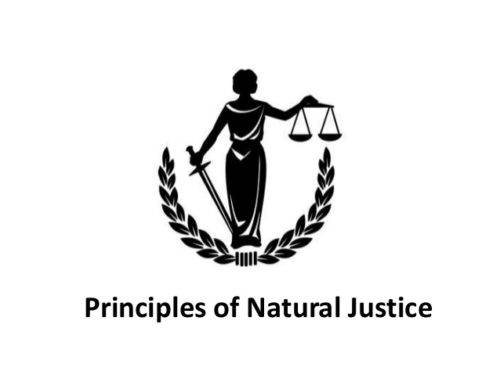Table of Contents
Audi alteram partem – Principle of natural Justice
Introduction – Audi alteram partem
Audi alteram partem is a principle of natural justice. Audi alteram partem is from a latin phrase “audiatur et altera pars”. Its meaning is also the same as hear the other side. . It means that no one should be condemned unheard. It required that both sides should be here before passing the order. This rule insists that before passing an order against any person a reasonable opportunity of hearing must be given to him.
This rule implies that a person against whom an order to his prejudice is past should be given information as to charges against him and should be given an opportunity to submit his explanation thereto. Principles of Natural Justice is never directly mentioned in the Indian Constitution but is indirectly mentioned as is there in Article 14, Article 226, Article 227, Article 311 etc.
Meaning of principal Audi alteram partem
It means that no one should be condemned unheard. In Earth’s civilized society it is assumed that a person against whom any action is sought to be taken and right or interest is being affected shall be given a reasonable opportunity of being here must be afforded to him. This rule of natural justice intends to prevent the authority from acting arbitrarily affecting the rights of the concerned person. Duty to give reasonable opportunity to be heard will be implied from the nature of the function to be performed by the authority which has the power to take punitive action.
Elements of Audi alteram partem
- Notice
- Hearing
- Evidence
- Legal Representation
Notice
Authorities send a notice to the affected person and this is the prior condition to start hearing. Hence Notice is the starting point of hearing. Unless a person who doesn’t have knowledge of the case against him cannot defend himself. Therefore before proceeding starts draught letter concerned is required to give to the affected person the notice of case against him. The proceeding started without giving notice would violate the principle of natural justice. For this purpose notice to be served on the concerned person properly. Also notice must give sufficient time to the concerned person to prepare his case.
Case law
Keshav Mills Co. Ltd. v. Union of India
The notice which is given to the parties should be clear and unambiguous.
Hearing
The second ingredient of Audi alteram partem rule is hearing. If the order is passed by authority without providing the reasonable opportunity of being here to the person affected by it adversely be invalid and must be set aside.
Fair hearing: Hearing must be fair. Following are the requirement of fair hearing :-
- Adjudicating authority should receive all material facts which individual Sikh to produce.
- It should disclose all the facts, evidence or material which authority seeks to achieve against the individual concerned in making a decision.
- It should afford to the individual concerned an opportunity to refute all facts and material.
Oral Hearing : Oral hearing is important in the view of getting Justice. Where technical questions are involved oral hearing is must.
Chief and Cross examination:
Chief examination and cross examination disclose such facts which might not be included in complaint or plaint. To know the truth this is an effective method of questioning parties and witnesses.
Evidence
The right to know no the material on which authority is relying and going to make decisions is part of the right to defend oneself. No evidence can be taken into consideration which has not been known to the party concerned and for which no opportunity has been offered a rebute. One can defend himself only when he has full knowledge of all facts and evidence against him.
Legal Representation
The representation through a lawyer in the administrative adjudication is not considered as an indispensable part of the fair hearing. But, in certain situations if the right to legal representation is denied, then it amounts to violation of natural justice. In case of J.J. Mody v. State of Bombay and in another case of Krishna Chandra v. Union of India, it was held that the denial of legal representation will amount to violation of natural justice.
Exception to Rule of Audi alteram partem
Academic Cases and Interdisciplinary Actions :
Sometimes because of different facts and circumstances the case principle of Audi alteram partem can be excluded.
Case law
S.A. Khan v. State of Haryana
In this case, Mr. Khan was IPS officer and suspended by the Haryana government because many complaints were made against him. He filed a suit in the Supreme Court that he does not get an opportunity of being heard. The Supreme Court held that suspension was because of an interdisciplinary approach and there is no requirement of hearing once.
Statutory Exclusion
By making laws a statute can exclude natural justice either expressly or by necessary implication. But such a statute may be challenged under Art.14 so it should be justifiable.
Exclusion in the cases of Emergency
In case of state emergency except Art 21 Right to life all rights can be excluded. Conclusion
Audi alteram partem a principle of natural justice is evolved not from any law or constitution but from Humankind. It is adopted in administrative law for fair justice. One should be given the opportunity of being heard without which proper justice cannot be served.a

